ITTC-53 Banner

ITTC-53 Menu
Highlights for Wednesday, 29 November 2017
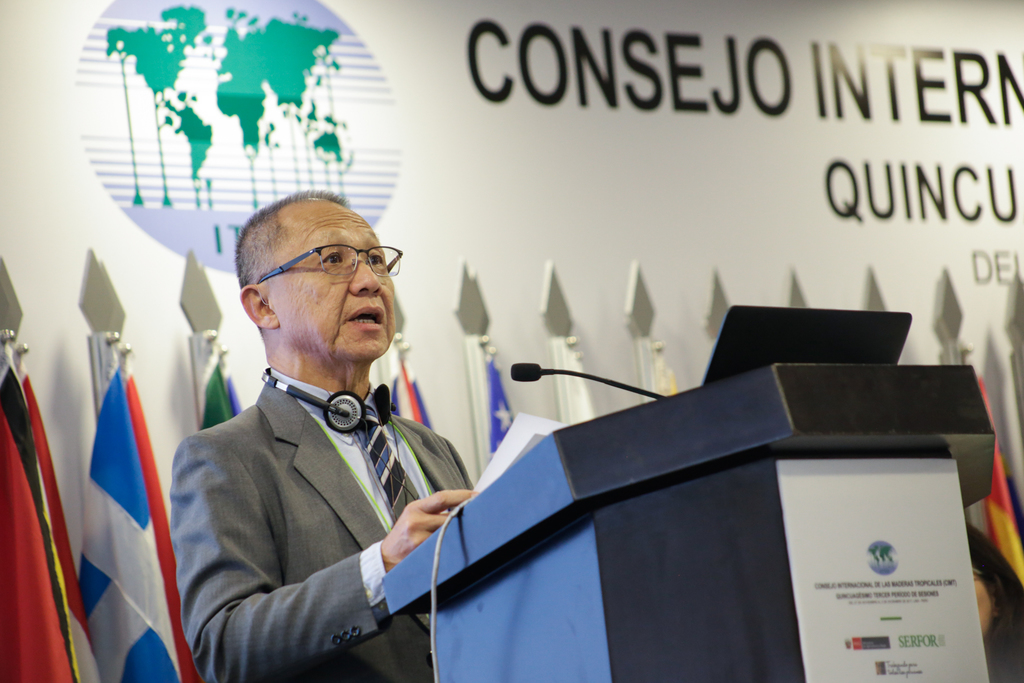
Barney Chan, co-chair of the Trade Advisory Group (TAG), presents the TAG statement at the Annual Market Discussion on day three of the 53rd session of the International Tropical Timber Council in Lima, Peru. Photo: D. Piaggio/SERFOR
The International Tropical Timber Organization should work closely with China and other ITTO members to promote the stable, legal and sustainable supply of tropical timber in China and worldwide, according to ITTO’s Trade Advisory Group (TAG).
In a statement issued at the conclusion of the 2017 Annual Market Discussion, held today in Lima, Peru as part of the 53rd Session of the International Tropical Timber Council, the TAG noted “a growing desire in China” to develop green timber supply chains.
The statement, which was presented by TAG co-chair Barney Chan, referred to a roundtable dialogue in September 2017 in Shanghai between 24 large timber companies based in China and ITTO’s top management, in which Chinese manufacturers expressed a desire to use legal materials in their products.
According to the TAG statement, all participants at the roundtable dialogue agreed that the aim should be to create a “green supply-chain mechanism” to promote the stable, legal and sustainable supply of tropical timber, bringing together all stakeholders.
ITTO Executive Director Gerhard Dieterle had earlier referred to the Shanghai roundtable and the proposed green supply-chain mechanism in his speech to the Council on Monday.
“We regard this as a significant initiative consistent with the core mandate of ITTO,” he said.
Responding to the TAG statement today, a delegate from the Government of China indicated her country’s support for a green supply-chain mechanism and requested technical assistance from ITTO in its development.
TAG was established to provide inputs to ITTO's policy and project work. It is open to anyone with an interest in the tropical timber trade, including representatives of tropical forest industries, timber exporters and importers, timber trade and industry consultants, and trade and industry associations.
The 2017 TAG statement also referred to growing wood demand for a range of uses, such as the construction of tall buildings and biomass energy.
“The issue for the private sector is how to galvanize financial resources to create the next wood fibre crops,” according to the TAG statement. The statement called on ITTO to set up a working group to guide ITTO’s future work on tree plantations.
Plantations were strongly in focus during the Annual Market Discussion, which was attended by about 150 people from the tropical timber industry, trade, government and civil society. Participants heard from six speakers addressing the theme of “sharing experiences on promoting investment in tropical timber industries and tropical forestry”.
Ingrid Nielsen, Head of Investment Advisory and Strategy Consulting in the Indufor Group, reported on a plantation project that had helped small-scale landholders in 60 villages in Tanzania establish 15 000 hectares of plantations with an investment of €20 million. Ms Nielsen concluded that “it is possible, it is profitable and it is sustainable” to scale up smallholders in clusters and associations to produce industrial-scale volumes of timber.
Erik Fisher, President of the Forest Committee Association of Exporters (ADEX), Peru, presented an example of a Peruvian natural-forest concession that was involving local communities, generating employment for 350 people, and stimulating the local economy while also halting deforestation in the area and providing significant biodiversity conservation benefits.
Ivan Tomaselli, President of Brazil-based STCP Consulting and Engineering, showed that Latin American countries with major plantation programmes had the region’s most dynamic wood sectors, and he outlined what he saw as the key enabling factors for sustainable forest-sector development.
Bob Tate, Executive Officer of the Papua New Guinea Forest Industries Association, said that the main barrier to investment in his country was policy and political uncertainty.
“The conflict and confusion created by parties with differing development objectives only serves to ward off potential investment in forest industrial development and drives home the message that investors beware—the rules may change at any time and for any reason,” he said.
Christian Held, Deputy Head of the Forest Investment Division in UNIQUE Consulting, Germany, suggested that the three main timber production models—natural forests, forest plantations, and silvopastoral and agroforestry systems—were all important for meeting future timber demand. Nevertheless, data from UNIQUE operations in Uruguay indicate that sustainably managed plantations are ten times more profitable than sustainably managed natural forests.
Rik Sools, Deputy Director and Senior Forestry Export for FORM International, the Netherlands, spoke about his company’s work in Ghana and Tanzania to attract investments to create about 12 000 hectares of forest plantations. Among the success factors were phased development, the use of a sound, sustainable model that addressed social and environmental issues, high biological growth, and a blend of public and private investment.
The presentations from the Annual Market Discussion are available here.
The Council convened in the morning of day 3. Among other items, it discussed the report of the Ad Hoc Working Group to Consider Rotation in the Framework of the Selection of the Executive Director Established Pursuant to Decision 9(LII), which was established to examine options for rotation in the appointment of ITTO executive directors. The Chair decided to establish a contact group that would meet during the session to make progress on the matter.
The Joint Session of the Committees, under which the Annual Market Discussion was convened, also received the report of the Expert Panel for Technical Appraisal of ITTO Project Proposals, presented by the Panel’s chair, Jobst-Michael Schroeder of Germany.
Daily coverage of the session by the Earth Negotiations Bulletin is available at http://enb.iisd.org/forestry/itto/ittc53/
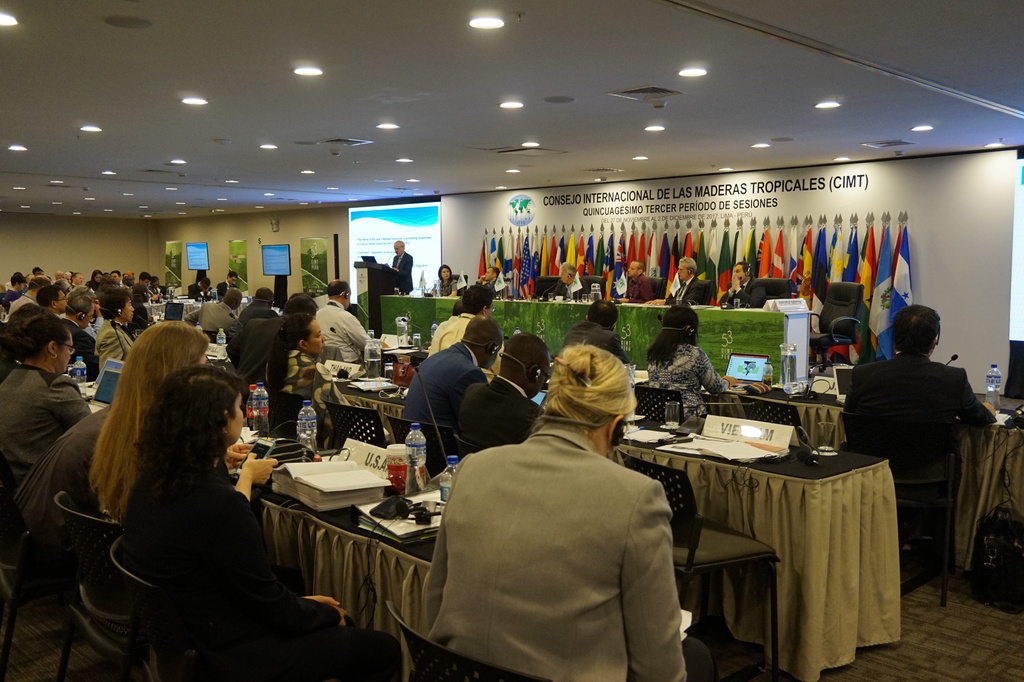
Attendees listen to a presentation at the Annual Market Discussion convened on day three of the 53rd session of the International Tropical Timber Council in Lima, Peru. Photo: R. Carrillo/ITTO

A delegate of China reacts to the TAG's statement during the Annual Market Discussion held on day three of the 53rd Session of the International Tropical Timber Council. Photo: D. Piaggio/SERFOR

André de Boer, Secretary General of the European Timber Trade Federation, and Sheam Satkuru, ITTO Secretariat, chat at the Annual Market Discussion on day three of the 53rd session of the International Tropical Timber Council in Lima, Peru. Photo: Rahmayanti

A delegate of India makes an intervention at the Annual Market Discussion on day three of the 53rd session of the International Tropical Timber Council in Lima, Peru. Photo: Rahmayanti

A delegate of Papua New Guinea (left) and a delegate of Japan chat at the Annual Market Discussion on day three of the 53rd session of the International Tropical Timber Council in Lima, Peru. Photo: Rahmayanti

A delegate of Colombia makes a point at the Annual Market Discussion on day three of the 53rd session of the International Tropical Timber Council in Lima, Peru. Photo: Rahmayanti

Speakers Rik Sools (left) and Ivan Tomaselli (right) talk with a delegate from Ghana at the Annual Market Discussion on day three of the 53rd session of the International Tropical Timber Council in Lima, Peru. Photo: Rahmayanti

Participants interact at the Annual Market Discussion on day three of the 53rd session of the International Tropical Timber Council in Lima, Peru. Photo: Rahmayanti
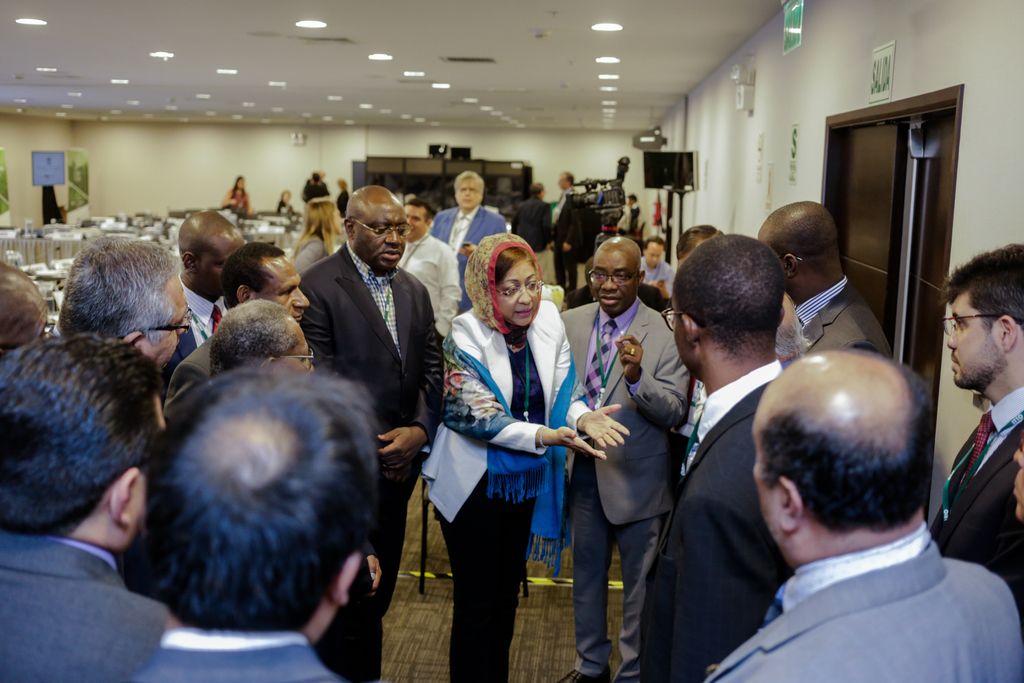
Members of the producer caucus consult informally on day three of the 53rd session of the International Tropical Timber Council in Lima, Peru. Photo: D. Piaggio/SERFOR
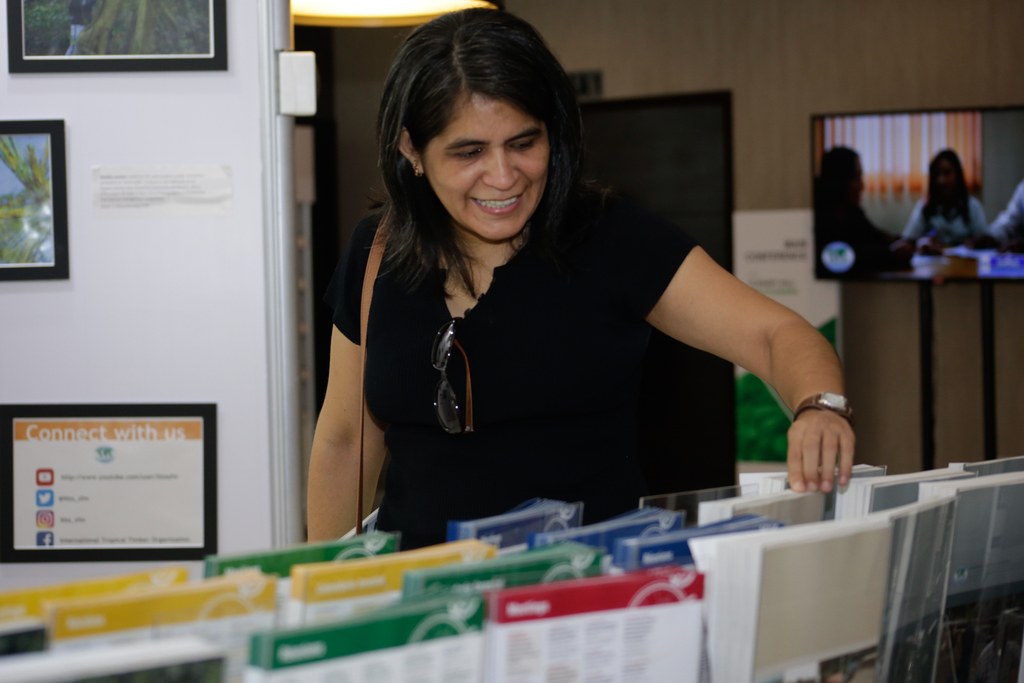
A side-event participant browses ITTO publications on day three of the 53rd session of the International Tropical Timber Council in Lima, Peru: Photo: D. Piaggio/SERFOR
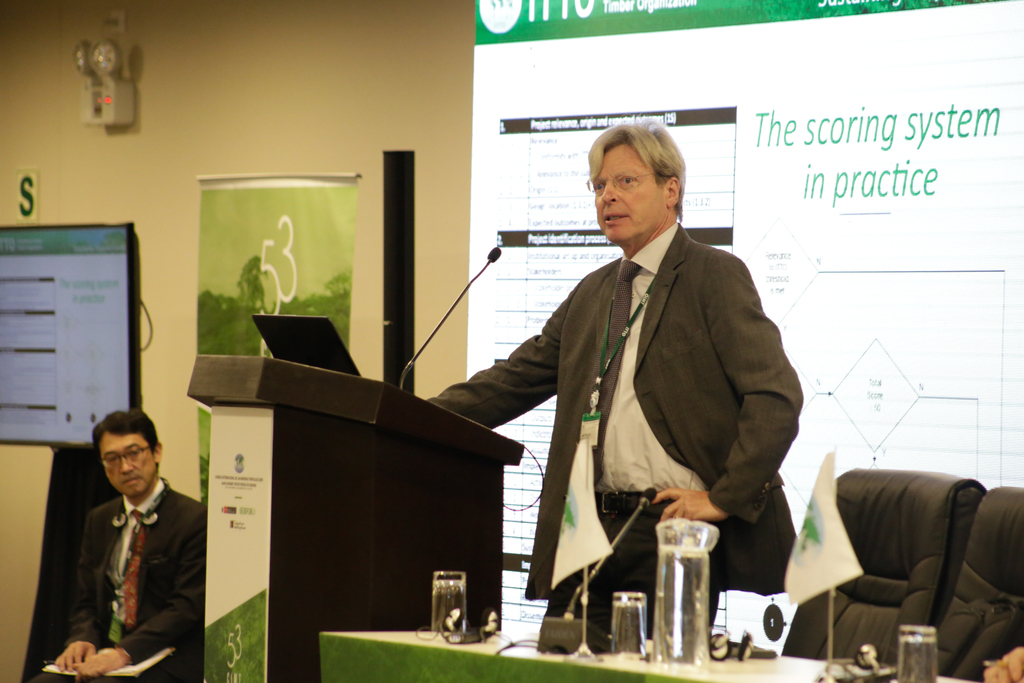
Jobst-Michael Schroeder, Germany, presents the report of the Expert Panel for Technical Appraisal of ITTO Project Proposals on day three of the 53rd Session of the International Tropical Timber Council in Lima, Peru. Photo: D. Piaggio/SERFOR

ITTO Executive Director, Gerhard Dieterle listens to a presentation at the Annual Market Discussion held on day three of the 53rd Session of the International Tropical Timber Council in Lima, Peru. Photo: D. Piaggio/SERFOR

ITTO Secretariat staff and the Chairperson of the Committee on Forest Industry, Mr Lokossou Achille Orphée (right), discuss an issue during the meeting of the joint Committee on Economics, Statistics and Markets and Forest Industry on day three of the 53rd Session of the International Tropical Timber Council. Photo: D. Piaggio/SERFOR